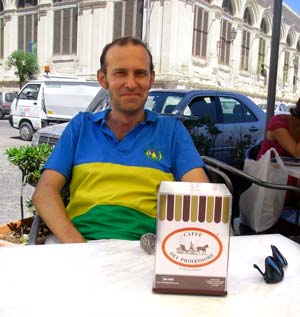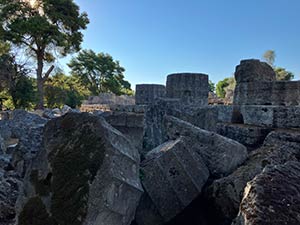Nigel Nicholson
 Walter Mintz Professor of Classics
Walter Mintz Professor of Classics
Greek and Latin literature, critical theory.
nigel.nicholson@reed.edu
Education and Employment
Research and Current Projects
Publications and Papers
Outreach Programs
Study Abroad in Sicily Blog
Courses Taught

Classical Literature and Civilization Classes in Translation
The department offers a good range of courses in translation, whether in history and archaeology or literature. One class I am currently teaching is on ancient Greek athletics. It sits at the intersection of poetry, politics and sport, examining how athletic victory was transformed into a valuable possession by the fantastic poems and statues that victors commissioned to celebrate their wins. What does it mean to say someone has talent? That athletes are beautiful, or manly? Or to see athletic success is an index of broader qualities of mind and character? Why are some activities Olympic events and others not? What does it mean to be a winner? We also explore the modern Olympic movement and how it has used and misused its ancient legacy, and we get some practical experience of sports in Portland, as both spectators and trainees…
In the past, I have also taught classes that introduce students to some of the main currents in literary theory in the last fifty years, and the application of these theories to works of literature. In particular, I have focused on Marxist Literary Theory, New Historicism, Postcolonial Theory, as well as New Criticism, Narratology, and Semiotics. The focus was very much on understanding and critiquing the theories through their application. The literary theory options offered by the division of literature and language have blossomed in recent years, and so students have many options here, but I also work hard to introduce literary theories into my other classes.
First-Year Language Classes:
Greek (Greek 110) or Latin (Latin 110)
These are one-year courses intended to give students a solid knowledge of the grammar and syntax of Latin or Greek, as well as a functional vocabulary. The goal is to put you in a position where you can read Latin or Greek works in their original language with the assistance of a dictionary and a student commentary, something we do in higher-level language classes
When I teach these classes, work of some sort is due every day (either written work or learning or both), and testing is regular and rigorous. As in any language class, attendance is crucial. No prerequisites.

Second-Year Language Classes:
200-level Greek and Latin
The basic goal of these classes is to solidify your grasp of grammar and syntax, build your vocabulary, and also begin to engage in the literary studies that will be central in the 300-level classes. Prerequisites: 110, a placement exam of the appropriate level, or the consent of the instructor.
Humanities 110 (Reed’s Required First-Year Seminar)
I rotate in and out of Hum 110, and very much enjoy the class. The class centers around building the skills you need for strong college-level work, especially essay-writing (so, skills of analysis and expression), but also discussion and preparation. The class has an ambitious, exciting and interesting scope, bringing together four units centered around ancient Egypt, Yehud/Israel and Persia; ancient Greece; colonial Mexico; and the Harlem Renaissance. No prerequisites – and indeed required of all first-year students, and recommended for most transfers also.
Literature Classes:
300-level Greek Classes and 300-level Latin Classes
These classes focus on the study of Greek and Latin literature; a basic ability to read the texts is presumed, though some material is also read in translation. Considerable amounts of criticism are also read, and the class is focused on interpretation. My particular interests are in political readings, that is in examining how the texts in question support particular interests, but we approach the texts from many angles. I mostly ask students to write a number of medium-length papers, but have also done a research paper instead.
Past topics in Greek have included: Pindar and Bacchylides (Greek lyric poetry celebrating athletes); fifth-century Syracuse; Aeschylus’ Oresteia; Sophocles’ Ajax and Philoctetes; the Greek novel, in particular, [Longus'] Daphnis and Chloe and Chariton's About Callirhoe; the Hellenistic poetry of Callimachus and Theocritus; and Greek lyric poetry before Pindar.
Past topics in Latin include: Latin love elegy (Propertius, Tibullus, Catullus and Ovid), Ovid’s Metamorphoses, and Martial’s epigrams.
My goals in my literature classes are to extend students' abilities to interpret complex works of art. This means deepening their abilities to read the text closely and trace its relations to other literary texts, but also expanding their horizons so that they can relate the texts to both the grander political narratives of their day and the more trivial realities of Greek or Roman life, such as the physical spaces in which Romans lived their everyday lives, and the daily practices and actions which constituted those lives. Prerequisites are a year of 200-level work in the relevant language.
For more details on any of these classes, contact me or come and see me, or consult the catalog.